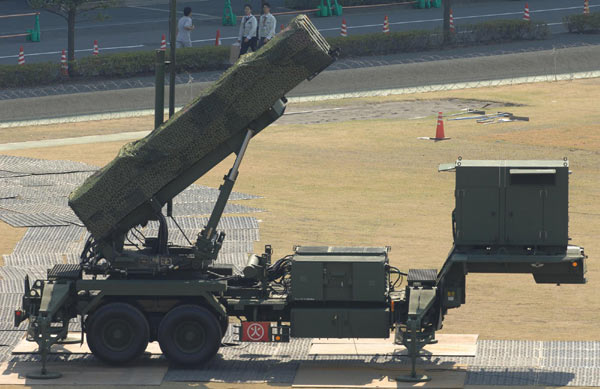Japan deploys interceptors for launch
Updated: 2012-04-10 06:57
By Zhou Wa (China Daily)
|
||||||||
Japan completed the deployment of interceptor missiles on Monday, the country's Defense Ministry said, as the Democratic People's Republic of Korea has moved all three stages of a long-range rocket into position for a controversial satellite launch.
Japan's Self-Defense Force has installed ground-based Patriot Advanced Capability-3 interceptors on Okinawa, Ishigaki and Miyako islands and in Tokyo, Xinhua News Agency cited the ministry's official Takaaki Oono as saying.
 |
|
A ground-based Patriot Advanced Capability-3 interceptor is seen in Tokyo on April 9, 2012. [Photo/Xinhua] |
In addition, three Maritime Self-Defense Force Aegis destroyers are on their way to the East China Sea, according to the ministry.
"Japan's intercepting maneuvers are worth focusing on," said Chen Qi, an expert on East Asian studies at Tsinghua University.
The planned launch of the DPRK's rocket will add more uncertainty to the nuclear issue on the Korean Peninsula, Chen said.
The DPRK has announced plans to launch an observation satellite using a three-stage rocket between Thursday and April 16 to celebrate the 100th anniversary of the birth of the country's founder Kim Il-sung.
The Kwangmyongsong-3 satellite will be launched using a long-range rocket from the DPRK's northwest. Pyongyang has insisted that the launch is a scientific achievement intended to improve the nation's economy.
However, the satellite launch plan has aroused concerns from the international community. The United States, Japan, Britain and other nations have urged the DPRK to cancel the launch, warning that firing the long-range rocket would violate UN resolutions and Pyongyang's promise to suspend its nuclear and missile activity.
According to Xinhua, an official from the Joint Chiefs of Staff of the Republic of Korea told reporters at a briefing on Monday that the ROK and the US "are keeping close tabs on movements" related to what the official called the DPRK's "long-range missile launch".
The ROK military is "fully prepared" to respond to any acts of provocation, Xinhua cited an ROK official, who declined to be named, as saying.
The ROK has said it might shoot down the rocket if it strays into its territory.
Philippine Airlines said on Monday that a dozen of its planes from the US, Japan and the ROK would be diverted from the rocket's potential path to protect its passengers, according to The Associated Press.
On Sunday, the DPRK invited a group of about 70 foreign journalists to visit the Sohae Satellite Launching Station in the DPRK's northwest and observe the 30-meter high Unha-3 rocket, which will carry the Kwangmyongsong-3 into space.
"It is a carrier rocket but not a ballistic missile," Xinhua quoted Jang Myung-jin, who is in charge of the station, as saying. He said the launch was a peaceful program aimed at developing the DPRK's economy and raising the people's standard of living.
Chinese Foreign Ministry spokesman Liu Weimin said on Monday that China has maintained contact with the parties involved about Pyongyang's satellite launch, but did not respond to a question over whether China would send officials to view the satellite launch.
The ministry has expressed China's concern about the development of the situation and called on all relevant parties to take a broad and long-term perspective, remain calm and exercise restraint, and seek proper solutions to relevant issues through diplomatic channels and peaceful means.
zhouwa@chinadaily.com.cn

 Relief reaches isolated village
Relief reaches isolated village
 Rainfall poses new threats to quake-hit region
Rainfall poses new threats to quake-hit region
 Funerals begin for Boston bombing victims
Funerals begin for Boston bombing victims
 Quake takeaway from China's Air Force
Quake takeaway from China's Air Force
 Obama celebrates young inventors at science fair
Obama celebrates young inventors at science fair
 Earth Day marked around the world
Earth Day marked around the world
 Volunteer team helping students find sense of normalcy
Volunteer team helping students find sense of normalcy
 Ethnic groups quick to join rescue efforts
Ethnic groups quick to join rescue efforts
Most Viewed
Editor's Picks

|

|

|

|

|

|
Today's Top News
Health new priority for quake zone
Xi meets US top military officer
Japan's boats driven out of Diaoyu
China mulls online shopping legislation
Bird flu death toll rises to 22
Putin appoints new ambassador to China
Japanese ships blocked from Diaoyu Islands
Inspired by Guan, more Chinese pick up golf
US Weekly

|

|







